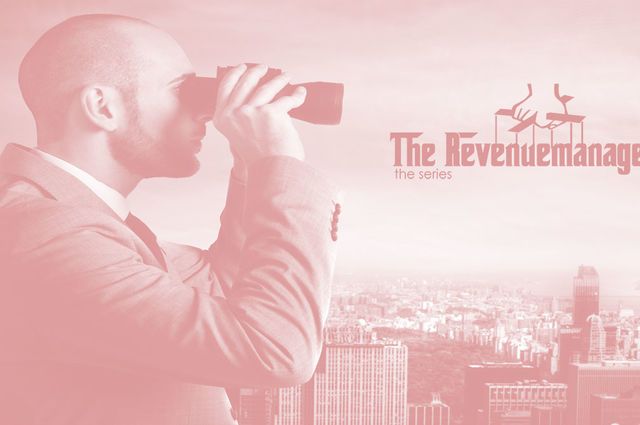Beyond Room Revenue - Revenue Management opportunities for 2021 and beyond
23 experts shared their view
COVID has hit the global hotel industry hard. But as with every crisis, new opportunities surface. During the financial crisis of 2008/09, we saw Airbnb and Uber emerge.
Many revenue-generating ideas were born over the past year. From staycation and workation to renting out equipment and even offering outsourced services like housekeeping. Hoteliers have been creative in finding ways to keeping their business afloat.
What was born out of a need for survival might lead to a more permanent shift in a hotel's business model.
The idea of non-room revenue is nothing new and even pre-pandemic was something more and more hotels embraced. F&B or MICE revenue management is still in its infancy for the overall industry but terms like Total RevPAR have evolved from buzzword to serious KPI.
Is now the time to look at non-room, ancillary revenue? Where are the opportunities?
Industry has been talking about moving beyond rooms revenue for decades. Concepts like Total Hotel Revenue Management have been extensively talked about, but not systematically acted upon. The pandemic forced operators to think very differently about the building, moving away from defined space usage, to a more flexible, need-based model. This forced innovation, and its (relative) success in generating revenue in difficult circumstances, will hopefully be the motivation to stop talking and start acting!
However, for this to become a true shift, the barriers that held industry back from achieving the vision pre-pandemic will still need to be addressed. Incentives will need to be realigned away from narrow function based goals like room nights generated, to more broad asset based goals like total profit or total revenue. Metrics will need to be developed that reflect these new goals. Access to more holistic data will be required, so that each department or function is better able to understand the impact of their decisions on overall asset performance. And finally, technology will need to evolve to a model that will allow hotels to price and sell the space more flexibly.
Overcoming these barriers hasn't gotten any easier, but hopefully the short term demonstration of the art of the possible will provide inspiration to continue momentum. I remain hopeful that this innovation will continue, but it is up to the entire industry to keep the pressure on to ensure that supporting systems and processes align to support it.
The pandemic only accelerated again an opportunity that was there even before. To effectively apply a total revenue management strategy beyond room revenue, Hotels need to change the perception of hospitality being less about just selling rooms, and more like a retail business. In such low demand, Hotels must focus on how to drive revenue beyond the core business (room sales) through alternative space usage and ancillary revenue.
Alternative space usage: who would have thought that Hotels would sell their room as an office space, turn their restaurant into a ghost kitchen or sell the suite as a private dining room? The segments' demand evolution post-pandemic saw the rise of different customers and different needs, which required the Hotels' strategy adaptation towards a more local and experience-driven target.
Ancillary revenue: simply put, the buying cycle of the guest does not end after we sell the room. The room purchase is part of the “travel budget” but when at the property, the guest opens the “leisure budget” for extra leisure spend such as room upgrades, dinner, spa…there is an opportunity to tap into that second wallet and create a memorable personalized experience for a deeper engagement of the guest and incremental extra-spend and Total RevPAR for the Hotel.
The pandemic deprived people of the joy of travel and therefore the pent-up demand will be strong: guests will be willing to enjoy the vacation they longed for long. Opportunities are there as long as the Hotels change their sales approach and become relevant (one-size does not fit all) and specific (granular segment strategy) on their non-room revenue strategy. It is, as always, just a matter of understanding and profiling what demand is out there e and how to satisfy and convert it with the right product and offer, at the right time.
Total Revenue Management offers all of the opportunity and none of the mystique if you're lucky enough to have different profit centres. The same principles of rooms revenue management apply but with key practical differences with different thought processes and different outcomes.
First the cost base will differ; for F&B, food costs are higher than room turnaround costs. There's more flexibility in capacity management; think about the different room set up in meeting space. Available inventory can change over time; Golf course tee-times are governed by daylight hours and can be influenced radically by season. Spa menus can adapt to reflect popularity and profitability. And many profit centres can be adapted to reflect the new operating scenarios in the pandemic; for example offering shorter food menus to keep down waste and cost, or migrating to takeaway services. We've seen some fantastic creativity around this and its set to continue. One other key takeaway - keep Profit Management front of mind as a primary metric alongside Total Revenue Management.
One thing the pandemic proved is that revenue is revenue, regardless of its departmental, origin. Potentially, the Meetings & Events revenue stream represents about 20% – 35% of total revenue, revealing the need for active optimisation. Moreover, In Meetings & Events larger revenues are attached to one inquiry. Accepting a $2.000 meeting could block inventory and prevent you from hosting a $70.000 conference. The stakes are high, but the rewards even higher (even currently reducing a 0, the dilemma remains). A data-driven approach will boost confidence and empower everyone involved to take decisions and move away from the first-come-first-serve approach that leaves a lot of revenue on the table.
The hospitality industry has shown resourcefulness and resilience in the past year. Many creative ideas were born out of the absolute need to think outside of the box. Let's continue in this fashion, even when the pandemic becomes a vague memory. Meetings & Events as a concept is too narrow to reach hotel function space's full potential. Meeting rooms remain empty on weekends, holidays and evenings. Understandable, bosses who schedule meetings in the evening don't make themselves popular, but this also results in a massive missed opportunity.
We need to move away from the idea of "Meetings & Events" and instead think about "Space as a Service". Simplistically, you have a certain number of square meters. You sell the square meters for meetings (yes), events (yes), but anything else is possible as well, especially during “low-time”. I think of space for exhibitions, workshops, rehearsals, pop-ups,... and the sky really is the limit here. The only limitation should be a cultural fit with your hotel concept. A revenue manager is responsible for selling these square meters in the most profitable way possible.
The concept of Total RevPAR is a positive step forward, but still places hotel rooms at the center. Why not talk about Total Revenue per Available Sqm instead? At the end of the day, that's what it's all about.
There has never been a better time to offer non-room products and services to hotel guests. While it's not easy to compare year-over-year in the current global situation, we see a marked increase in guest demand for these offers in the first quarter of 2021 vs. the first quarter of 2020. This continues the trend we had seen even prior to the pandemic, and we expect this trendline to keep rising. Why? Because guests are already used to purchasing ancillary services from other travel providers to be able to customize their travel experiences. As travel comes back, we expect guests will absolutely want to create a hotel stay that meets their needs in an uncertain time.
Hotels should seize this opportunity to rethink their revenue strategies – guests have a changed mindset, and we as an industry should change ours. This doesn't mean nickel-and-diming guests – this means understanding what in your brand or hotel group or property is valued by your guests so you can present offers they are actually willing to buy. Hotels using Oracle's Nor1 upsell and guest engagement solutions are presenting food and beverage offers, including boxed meals, in-room cocktail sets, and pre-ordered in-room dining; discounted parking passes; and the always popular (and always profitable) early check-in and late check-out.
As other on-property services open up, including restaurants, bars, spas, and full-service pools, we encourage our customers to capture that guest demand for a 'normal' travel experience by offering up those services from booking to check-in. We do hotel, and our guests, a disservice if we don't.
The pandemic has forced hoteliers to find new ways of income. Finally, they started a process that should have been already in place: look beyond room revenue and maximize all the revenue streams.
No ways that after the rooms, F&B and conference & events are the main revenue drivers in most hotels, but in this time we do need to rethink our whole hotel strategy in order to capture all the opportunities.
The first step is to think out of the box and reimagine your offer by looking at EVERY SINGLE SQUARE METERS of the hotel according to the arising customer needs and sell EVERY SERVICE COMBINATION that could be of interest for a “new” kind of customer.
This means to rethink and rearrange the spaces for different uses: bedrooms not only for accommodation, conference rooms not only for meetings! Some examples, the already established workcation and staycation, but also bedrooms used for private meeting, day use/work spaces for meeting participants or suite terrace for private dinner etc.
In the past many hotel services have been conceived only for the in-house guests , but now it is crucial to open our services to the residential to detect the local demand. So, why don't sell parking slots, breakfast, working spaces, luggage deposit to the local/non guests?
Other opportunities could come from the use of technology (like chatbots, web check-in, concierge tools) that can help selling ancillary and upselling before the arrival or during the stay.
TRevPAR will be for sure the “new” strong KPI or even RevPAM could be soon applied not only in MICE but as a metric for all hotel spaces.
So be creative, flexible, detect the demand, introduce new services, rethink all the spaces and open your services to the local market.
It will be leisure guests that will be the main revenue drivers, are willing to spend more On Site, this means that we have an excellent opportunity to increase revenue from non-room departments such as restaurant, spa, activities, etc. There are a few challenges to tackle, though.
1. Knowledge - Applying Revenue Management differs from department to department. Revenue Managers need to learn to apply different types of Revenue Management and will have to be aware that they will be communicating their strategies with departments that never have worked with Revenue Management before.
2. Statistics - No Revenue Management without statistics, and we need to have clean data to understand our full potential. This means again a bit of education towards the staff as they will need to understand the importance of how they insert the data in the systems. And that brings us automatically to the third point:
Systems - As most of the hotel systems only track ancillary revenue when this comes in relation with room revenue, all non-room revenue that is not posted on a room cannot be tracked. For properties with many external guests, this means that they will never be able to properly benchmark their result towards the competitors
The topic of non-room ancillary revenue is certainly an interesting one in the current environment. On one side, there is a lot of pressure from hotels to maximize profitability. However, given the increase in available supply, it makes it more difficult to implement some of these strategies when the competitive set might be offering some of these services for free.
There is an opportunity to reimagine our services and offerings in the post COVID world. For example, pool cabanas are the perfect isolation vehicle for friends and families who want to be together in a safe place. As the demand for leisure travel continues to increase, this is an area where we can further expand and offer more customized services.
One of the biggest opportunities I see is to continue reimagining guestrooms. Hoteliers could assign unique rooms to be used for day meetings, Zoom calls, etc. Rooms could also be sold for day parts: AM & PM, doubling the income while avoiding the expense and linen usage of a traditional overnight stay. We've seen this play out in a similar way as some hotels have transformed guestrooms into private dinner spots for small gatherings and dates. One of the most interesting developments of the pandemic is the use of outdoors space. While very typical outside the US, it wasn't until now that the hospitality industry came up with expanding patios, sidewalk restaurants, tents etc.
There is a time and a place for ancillary revenue in the post-COVID world, but in general I believe we can expand on reimagining our spaces and offering the services future guests will require.
By viewing the entire building/space as a series of opportunities to drive revenue will not only drive top line revenue but also increase asset value. The obvious focus would be to concentrate on staying customers to increase revenue opportunity through F&B, MICE or other retail streams, however looking at local footfall and local residents could also unlock opportunity.
Seeing potential "dead space" in corridors or large lobby areas could be utilised as delivery points for online shopping, or turning rooftops into farming areas with beehives or aquafarms for fish.
TRevPAR is certainly going to be an important measure, but looking at profitability across all square metres of the building will be even more powerful.
COVID will (hopefully) be a catalyst for change in many respects. The big opportunity may counterintuitively lie in forgetting all we think we know about our guest: (s)he wants to book a standard room with breakfast and if we're lucky pay a visit to the bar to spend some extra cash, at what we think is an acceptable price tag. Unlearning the past can help the revenue community refocus on why a guest, internal or domestic, wants to come to our hotel and what parts of the experiences we have to offer that guest is looking and actually ready to pay for. In some cases this will be a room with breakfast, in others it will be a private dining experience, some hours at the gym or spa or a place to work with a view for a day. The options are endless and so are the strategies and ways of tracking the results. Revenue management just got a whole lot of more fun!
I think there are two big opportunities here, first one would be the upselling and the second one the F&B sector.
These two areas will lead the biggest opportunities after the crisis...
A) Upselling: I have the feeling that Upselling has been forgotten from the customer journey perspective, and the hoteliers has forgotten that from a long time (probably since the beginning of the upselling methology),
We used to upsell only during the check in and during that phase it was like a forced process for receptionists.
Since the pandemic started hotels has been forced to maximize the income so the upselling method has been improved.
A lot of companies have risen in that day to give us the opportunity to incorporate upselling to the whole customer journey and this is helping hoteliers to improve that incomes.
B) F&B: This is the second big opportunity for the industry, its time to grow the revenue management culture in that sector and there a lot of revenue managers ready for that., unfortunately there are a lot of revenue managers without job so they are trying to develop these skills in other industries so some of them are focus on F&B industry so we will see a lot of new cool things In the next months like an RMS solution for F&B sector and the consolidation of the Revenue Manager role in that industry.
As it relates to non-room revenue, we only have to look around us to find opportunities. If you have meeting space, perhaps you can look at possible alternative uses for the space on a temporary basis. One example would be to create co-working meeting space for local businesses and entrepreneurs. Many hotel guests, as well a local guests, are looking for safe dining options and may not comfortable utilizing a restaurant yet. If you have a number of smaller meeting rooms consider utilizing them as private dining rooms as an extension to your restaurant or local restaurant nearby.
There may still be opportunities to assist in your community recovery by making your meeting space available to the medical community for vaccination centers, quarantine quarters, etc.
If you have an outdoor pool and fitness facilities, consider renting excess capacity to the community surrounding the hotel.
These are just a few ideas on how to repurpose space and drive revenue by otherwise underutilized real estate inside your hotels. As with anything, it is important to take the time to measure profitability, how it will affect existing in-house guests, and how it may create goodwill to your local community.
Where there's value, there's revenue, yet the "how" we sell anything in addition to the core revenue stream (rooms) will make a difference.
Take the airlines, for example: most of them focus on their core service, flight seats, and postpone the most "revenuable" ancillary services and upgrades until the booking is confirmed, like car rentals, etc.
For whatever reason, this doesn't happen in the Hotel industry. And it's a pity because it's been proven that only AFTER having paid for the main service (flight seats for airlines) people are more inclined to purchase something more.
Again, the power of perception.
It is now a well-known fact that travel recovery will happen in phases, with the first phase being domestic leisure travel. While business, group and conference segments continue to be depressed, the larger reliance on leisure travel is accelerating the need for hotel companies to focus not just on room revenues as the driver of profitability. The combination of leisure travelers seeking experiences and the emergence of new technology platforms to allow the “merchandising” of those experiences, is making it easier. It is also becoming more and more efficient for travelers to purchase everything in (and eventually around) a hotel and also for hotel companies to take advantage of opportunities to increase share of wallet from their guests. In times of depressed demand, but green shots in the leisure segment, now is absolutely the time to look at all revenue opportunities and look for the right technology to support the retailing of experiences.
Room revenue is the main profit driver for many properties, so it is natural that the application of revenue management principles started there - but, it shouldn't end there. To determine if revenue management can have an impact in other areas of an operation, property leadership can look for the “big 4 ingredients”: Finite resource availability , Perishability, Market segmentation and Forecasted demand. These four ingredients exist in a number of areas including, marina slips, spa operations, parking, restaurants and meeting space for example.
Capturing ancillary spend from existing demand, capitalizing on emerging demand segments and catering to the needs of the local and regional markets is vital today – perhaps more than ever. Depending on where the property is in their recovery cycle, specific actions will look different; however, driving total property top-line performance while keeping a close eye on profitability will always be a constant in our industry, no matter what we may face.
In 2019, before any of us had ever heard of COVID-19, consumer behaviour was already leading smart hoteliers to look beyond room revenue and begin defining the product they sell as an experience, versus a simple hotel room. In early 2020 it would have been impossible to open the Hospitality Net home page without seeing the term Experience Economy in at least one of the headlines. And while since then, many hotels have unexpectedly been forced to survive without room revenue, if anything, based on the massive increases in travel related social media activity despite record low booking activity, this consumer shift has accelerated.
To address this evolution, every hotel should ask themselves what they can sell that a competitor, or an OTA, cannot. I guarantee, the conclusion will not be a bed and a toilet. It will almost certainly include a unique experience that only a local would have the connections to arrange, or perhaps even know about.
While some of these, like tickets to a local festival or the perfect set-up for a day at the beach can be turned into packages and generate revenue directly, even arranging a home-cooked local meal on a nice old lady's terrace can be part of a story that engages a future guest while they are still in the dreaming phase of their next trip.
This crisis is quite different from the one's faced by the hospitality industry previously. It has led hotels to reimagine their business models while being hyper-creative at developing opportunities for various revenue streams, including selling a room or an amenity or experience. Will it be sustainable post-pandemic? It certainly provides an opportunity to think beyond pandemic. Total Revenue has been a hot topic for some years and yet it is not mainstream. I believe it is time for the industry (Hospitality at large) to take a step back, look at strategic alternatives and think of the total revenue environment and where it needs to head from here.
For years, the hospitality industry has discussed the importance of strategies to increase ancillary revenue for hotels. Now with the COVID-19 pandemic and the huge impact on travel demand worldwide, it is the perfect moment for hotels to take this seriously and should be a top priority.
With the current crisis, hotels have realized that they need to create sustainability and greater diversification in the types of revenues from their operations. If and when a crisis like this happens in the future, hotels will need to be prepared to have some other source of revenue that will keep them operating in a scenario of a drastic reduction in demand from travelers. In our view, the great opportunity is based on hotels becoming an attractive demand or draw for the city or market in which it is inserted - even at a regional level.
For example, having one or more restaurants that generate high local awareness and demand, health and wellness, or leisure activities that attract people who want to have a different experience, without necessarily leaving their city are just some of the opportunities to pursue.
Workstations seems also to be a great opportunity for corporate hotels. Perhaps the greatest opportunity is in future projects not yet completed for hotels, or short-term rentals that can still adapt or redesign the project in terms of structure to offer a co-working / hotel/lifestyle product.
Regarding the lifestyle concept, we are seeing a consistent movement of large hotel chains to looking acquire smaller lifestyle brands. Much of this movement comes from the perception of the chains: a lifestyle product has the current best appeal with travelers. These lifestyle brands also have a large impact in attracting non-room revenue, with people from the local market coming to the hotel for happy hours, dinners, social events, and spas, among others.
Therefore, we believe that the current pandemic has greatly accelerated the transformation of the importance of Total RevPar, (making years of discussions become more concrete) and effectively making this indicator become vital to hotel operations.
There are significant revenue opportunities outside of room revenue:
1. Make your property the “hero of the destination:”
Bundling rooms with local places of interest and activities into attractive hotel packages offers significant revenue opportunities. Hoteliers know their destination, local attractions and places of interest better than anybody else. This is where hoteliers can truly outwit the OTAs a d Airbnb, and provide real value to their customers.
You can position your hotel as the “hero of the destination” by launching packages, special offers and campaigns that promote a more unique, local experience, such as places of interest and activities, tickets to local attractions and sporting events, local dining, local pub crawls (in future better times), visits to hidden boutiques and local hangouts, and complimentary passes for public transportation or Uber passes. Introduce “live like a local” messaging in your marketing efforts.
Even simple things like selling tickets to sought after museums or museum passes at the front desk or via the concierge can generate significant revenues. By buying museum passes at the front desk of my hotel in Paris I beat what was a minimum of three hour line to purchase museum tickets at the Louvre. The hotel was smart to promote this service on their website!
Do you offer hotel packages and bundled services to target your local, short-haul and drive-in feeder markets, such as:
- Family fun packages
- Activity packages
- Museum packages
- Theater packages
- Theme park packages
- Special occasion packages, etc.
- Weekend “Night on the town” specials
- Coronavirus de-stressing packages with with a wellness ssoecialist
- Spa packages at a nearby spa.
2. F&B Ancillary Revenue:
If marketed well to both hotel guests and locals, F&B can bring significant ancillary revenues to any full-service hotel. A few things to consider:
- Cooking classes
- Wine Tastings
- Chef's Menu Dinners
- Converting suites and hotel rooms to spaces for private dining.
- Coffee shop+WiFi in the lobby
3. Meeting Facilities and Hotel Spaces:
Opening the empty meeting facilities and hotel spaces to local customers and businesses can unlock great revenue opportunities. A few considerations:
- Co-Working Spaces
- Work-From-Hotel Daily Rates
- Rent-a-conference-room packages
- Pop-up Shops ( Roger Smith Hotel in New York City)
- Showrooms
Revenue Management has been described as the art of turning away business.
I don't think many of us turn a lot of business away these days. There simply is not enough demand to fill our rooms.
And if there are not enough rooms (and not enough room revenue), we need to find alternatives.
So, yes, now is the time to turn to alternative revenue streams!
Many hoteliers were very creative in finding these alternative revenue streams over the past year. Guest rooms were converted to day-office spaces, meeting rooms were rented to schools to allow for teaching in physically distanced ways, equipment and services were rented out, etc.
Hoteliers have learned that opportunities are not just within the rooms department.
We need to learn, as an industry, to better utilize our spaces. This applies to meeting rooms as well as guest rooms. Can a modular approach address peak demands in either department?
While this is certainly a consideration for new developments, how can existing properties benefit from this?
These are questions we need to ask.
We need to shift our mindset from a room-only / RevPAR-focused approach to a Total Revenue per available square foot (or meter).
And make that net revenue while we are at it...I find this particularly interesting to address low-demand periods moving forward. At some point, demand will be back and we will start selling out again but we will be able to take some of the current lessons to apply them in low season!
One of the surprises of this past year was, while overall revenue dropped across the board, upsell revenue remained pretty stable. This goes to show that there is a great opportunity to grow revenue further.
What are hotels upselling now? Is there any upselling beyond premium room types and possibly early arrival/late check-out? What about meeting & event upselling? Does your hotel follow the opportunities in this space?
Revenue management is no longer the art of turning away business. Revenue Management is the art of uncovering opportunities.
Any area of the business that has not embraced optimization has opportunity to do better. When we look at the other revenue streams we need to be prepared that things work differently, that systems are different, that other areas are requiring optimization besides "moving my rates up and down". Pricing might not be the single thing to focus on.
One thing that was highlighted during Covid is that many mistake "room revenue management" with "moving my pricing up and down and that's it" - and with that many failed as "what to do now?". Moving then into other areas we are just asking for trouble except if we accept that there will be a huge learning curve for everyone involved and that the hurdles to optimization are much greater. Plus couple that with the fact that we havent really cracked Revenue Management in the Rooms part as of yet, we are better, but a long long way to go still (80% of hotels not using systems comes to mind).
Overall there is opportunity, the revenue management field needs to decide though where to prioritise: Channel Management and Distribution optimization? Mice? or FnB? Total RM? etc. - and more importantly we need to accept that we will get it wrong at times and that is part of moving forward
Revenue managers need to focus on revenue generation. Upselling, cross-selling, total revenue management, new revenue streams should be part of the business strategy. Customization and personalization have to be at the core of revenue generation strategies. Put the guest in the driver's seat. Give the guest the freedom to create a perfect stay at your hotel. Do not wait until the guest books the room and then calls to place a request. Be proactive and turn such requests into revenue streams.
These are some ideas:
1. Let the guests build an ideal hotel stay by choosing room attributes and experiences at the time of booking (Add-On feature). Look at the hotel room as a base product, and then decide what you can sell separately: quiet room location, luxury linens, view, lower floor, cot, extra-large bed, etc. Think about additional services and experiences that will be of value to your guests: late check-out, champagne, fresh flowers, ticket to the local attraction, preferred parking spot, extra housekeeping service, laundry service, etc.
2. Stand out from the competition, drive direct bookings and increase total revenue by selling packages (Bundled rate type). Examine all hotel services and amenities and create bundles: Room plus variations of other elements like parking, spa service, tennis lesson, dinner, bar drinks, movie by the pool, etc. Packages have to be hotel-specific and stand out from competitors' offerings. Experiment! Listen to your guests. Find what works best.
3. Create innovative revenue streams. Hoteliers need to look at both spaces and staff expertise and find new ways of utilizing them. For example:
- Housekeeping services for residential and commercial clients
- Virtual and on-site cooking, cleaning, gardening, wellness classes
- Private chef and bartender for a luxury dining experience at home
- Laundry services for local residents and businesses
- Repurpose some hotel spaces to create co-working offices
- Day-use access to all hotel facilities & amenities for non-guests
Co-working spaces: With the focus on domestic travel for the foreseeable future, hoteliers need to look closer to home for additional revenue opportunities.
With the availability of great wifi, hotels can target the bleisure/workation market that will enable customers to extend their leisure stays beyond the weekend and spend longer periods working from the hotel. This goes hand in hand with converting unused convention or lobby space to a modular co-working space that should be available to hotel guests & also should be marketed to the local community. With so many people working from home and home-schooling, some people need an occasional retreat to a more professional environment.
In countries where home schooling is still the case, there is also an opportunity to attract families outside the school holiday season, as schooling can be done from the hotel followed by leisure activities afterwards.
Private events & Private dining: Revisiting all spaces in & outside of the hotel should open up a treasure trove of additional spaces that can be re-purposed and rented out for example for private dining in a Covid-proof environment, be it in a suite or at a newly created firepit.
Working with local communities will also allow you to rent out unused events spaces for Art or Yoga classes and similar.
F&B: On the F&B side, some properties have rented out their kitchens as dark kitchens during lockdowns to young delivery start-ups. The food delivery trend offers opportunities to sell not only take-away foods but also meal-kits for the restaurants signature dishes that can be sent to customers for them to cook at home.
Anti-food waste apps like 'Too good to go' are another opportunity for additional F&B revenues, as these can be used not only to shift left-over foods but with the right pricing also additional meals.
Excellent customer service: For hoteliers, there are also consulting opportunities with other companies that seek to improve their customer service and who better to learn from than the hospitality experts.
























